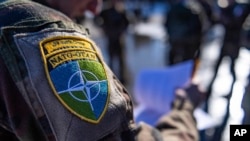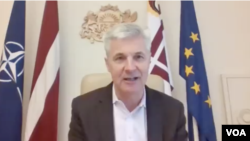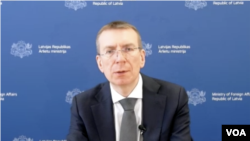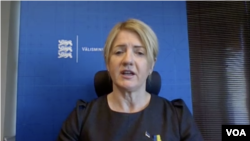The small Baltic countries, whose militaries have long been dwarfed by that of neighboring Russia, are renewing their push for NATO to establish a larger and more permanent presence on their territory following the Russian invasion of Ukraine.
Estonia, Latvia, and Lithuania — with a combined population of only about six million people — have long been seen as some of NATO’s most vulnerable nations. The countries joined the Western military alliance in 2004 but are connected to the rest of European NATO countries by only a narrow corridor, which lies between the heavily armed Russian exclave of Kaliningrad and Russia-allied Belarus.
The Baltics, former Soviet states, have watched with concern as Moscow tries to reassert influence across Eastern Europe. However, they have also been encouraged as Western countries fortify the NATO alliance in response to Russia’s invasion of Ukraine.
NATO had no forces in the eastern part of the alliance until 2014, when it decided to deploy four multinational battlegroups on a rotational basis to the Baltics and Poland in response to Russia’s annexation of Crimea. The NATO presence was further strengthened this year after Russia attacked Ukraine. In total, the Baltics now host about7,700 foreign NATO troops — nearly twice as many compared to earlier this year.
But even with those reinforcements, NATO forces in the Baltics likely could not defeat a large-scale Russian invasion, Baltic leaders warn. “If we want to be ready from the first minute of any kind of attack to defend our citizens, and if you want to give citizens of Latvia the same feeling of security as the citizens of France, Britain, Spain, (and) Germany…then there must be this permanent presence and more firepower and capabilities,” Latvian Minister of Defense Artis Pabriks told VOA in an interview.
Baltic leaders have long pushed for a permanent basing of U.S. troops, seeing it as the ultimate deterrent against a Russian invasion. Currently, U.S. troops are part of NATO’s Baltic rotational battlegroups, which are led by Germany, Britain, and Canada. During a Baltics tour earlier this month, U.S. Secretary of State Antony Blinken said “more permanent deployments” were being considered as part of a larger review of NATO’s defense posture. He did not offer details. But the United States has been reluctant to permanently station forces on Russia’s doorstep, fearing it would further upset relations with Moscow.
Many Baltic leaders hope a permanent NATO presence will be discussed this week when U.S. President Joe Biden visits Brussels, Belgium, for meetings with NATO and other European leaders. Asked about Biden’s visit, Latvian Minister of Foreign Affairs Edgars Rinkēvičs told VOA he believes “it is time that NATO states clearly that (its) presence in the Baltic states and Poland and Romania, in what we call the ‘eastern flank,’ is permanent.”
Estonian Minister of Foreign Affairs Eva-Maria Liimets also told VOA she hopes NATO leaders meeting in June in Spain will “make permanent decisions about how to strengthen defense and deterrence posture in our region.” Even though she conceded Estonia does not currently face a “direct military threat,” she said Europe’s security situation “has changed as a whole and therefore we must continue to strengthen the defense and deterrence posture of NATO so that we would be more protected.”
It’s not clear what a more permanent NATO presence in the Baltics would entail in terms of weapons. During the Cold War, the United States alleviated European security fears by positioning tactical nuclear weapons in countries such as Germany, pointed out Dan Plesch, a professor of diplomacy at the SOAS University of London. “Is that what is going to satisfy (Baltic) security concerns?” Plesch asked in an interview with VOA.
The Baltic nations are already protected by NATO’s commitment to defend its members in the event of an attack. NATO also has overwhelming air power superiority that would factor into any battle with Russia in the Baltics, Plesch pointed out. And at the moment, he added, Russia’s military looks even weaker than normal after sustaining significant losses in Ukraine.
The challenge is how to address Baltic security concerns while avoiding steps that would lead to a more unstable situation with Russia in the future. But with NATO and Russia each blaming the other for creating instability in Eastern Europe, that may be a difficult task.
Any NATO expansion is sensitive for Russian President Vladimir Putin, who cited the issue as a justification, among others, for his invasion of Ukraine. Putin still fumes over the Baltics’ decision to join NATO, seeing it as a betrayal of Western promises. Analysts say he would likely see the establishment of a permanent NATO presence in Eastern Europe as a violation of past agreements, including the 1997 NATO-Russia Founding Act (NRFA).
However, those agreements “can be regarded in significant part as null and void given Russian actions,” Plesch said. Another factor: the NRFA is not a legally binding document, added Mary Elise Sarotte, a Cold War historian and professor at the Johns Hopkins University School of Advanced International Studies. “This reality gives the alliance flexibility with regard to NRFA’s terms,” she told VOA by email.
Experts are mixed when it comes to predicting whether NATO will establish a permanent presence in the Baltics anytime soon. According to Plesch, much depends on how the situation in Ukraine progresses. Sarotte said it depends on how “permanent” is defined, but that “it is clear that a larger NATO presence in the east will happen, and will endure.”
In the view of Pabriks, the Latvian defense minister, NATO’s new approach to the Baltics should mean “much more capabilities, a classical strong presence in the region and also support to our national armies.” If Russia does not like the prospect of a more powerful NATO, he said, then it can always choose to “not threaten its neighbors.”



